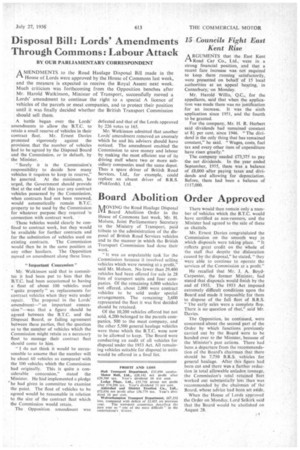Disposal Bill: Lords' Amendments Through Commons: Labour Attack
Page 39

If you've noticed an error in this article please click here to report it so we can fix it.
BY. OUR PARLIAMENTARY CORRESPONDENT J\,MENDMENTS to the Road Haulage Disposal Bill made in the 4-1 House of Lords were approved by the House of Commons last week, and the measure is expected to receive the Royal Assent next week. Much criticism was forthcoming from the Opposition benches after MT. Harold Watkinson, Minister of Transport, successfully moved a Lords' amendment to continue the right to a special A licence of vehicles of the parcels or meat companies, and to protect their position until it was finally decided whether the British Transport Commission should sell them.
A battle began over the Lords' amendments to allow the B.T.C. to retain a small reserve of vehicles in their contract fleet. Mr. Ernest Davies protested vigorously against the provision that the number of vehicles had to be agreed by the Disposal Board and the Commission, or in default, by the Minister.
"Surely it is the Commission's, responsibility to decide how many vehicles it requires to keep in reserve," he asserted. At the minimum, he urged, the Government should provide that at the end of this year any contract vehicles possessed by the Commission, when contracts had not been renewed, would automatically remain B.T.C. property to be used by the Commission for whatever purpose they required 'n connection with contract work.
These Vehicles would clearly be confined to contract work, but they would be available for further contracts and for the substitution of vehicles used on existing contracts. The Commission would then be in the same position as any other hauliers. The Opposition moved an amendment along these lines.
"important Concession
Mr. Watkinson said that in committee it had been put to him that the B.T.C. had been accustomed to having a float of about 100 vehicles used "quite properly" as replacements for contract vehicles when they were under repair. The proposal in the Lords' amendment—" an important concession "—was that a figure should be agreed between the B.T.C. and the Disposal Board, or failing agreement between these parties, that the question as to the number of vehicles which the Commission might retain as a necessary float to manage their contract fleet should come to him.
" I do not think it would be unreasonable to assume that the number will be about 60 vehicles as compared with the 100 vehicles which the Commission had originally. This is quite a considerable concession." stated the ,Minister. He had implemented a pledge he had given in committee to examine the point. The float of vehicles to be agreed would be reasonable in relation to the size of the contract fleet which the Commission would retain.
The Opposition amendment was defeated and that of the Lords approved by 226 votes to 165.
Mr: Watkinson admitted that another Lords amendment removed an anomaly which he and his advisers should have noticed. The amendment enabled the Commission to save money and labour by making the most efficient use of its driving staff where two or more subsidiary companies used the same depot. Thus a spare driver of British Road Services, Ltd., for example, could replace an absent driver of B.R.S. (Pickfords). Ltd.












































































































